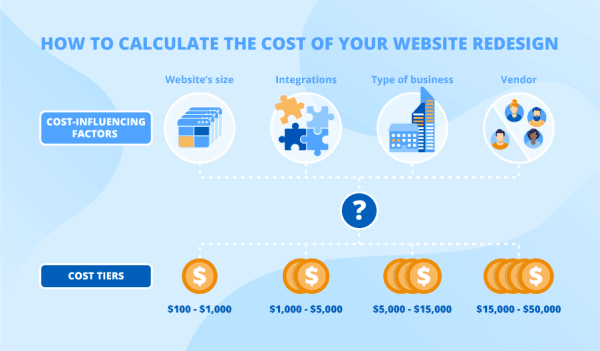Website Costs to Consider
It’s one of the most common questions in business: “How much should I spend on a new website?” The answer, frustratingly, is: “It depends.”
The cost of a new website is less like buying a car and more like building a custom home. You can get a pre-fabricated kit for a few thousand dollars, or you can commission a sprawling, architecturally-complex mansion for a seven-figure sum. Your budget for a website is driven entirely by what you need it to do.
Here’s a breakdown of the key factors that influence the cost of building a new website and how to determine the right budget for your business.
The Big Three: Complexity, Team, and Ongoing Costs
When you’re thinking about your website budget, it’s helpful to categorize the expenses into three main areas: the complexity of the project, who you hire to build it, and the ongoing costs to maintain it.
1. The Level of Complexity
This is the single biggest determinant of cost. The more features, pages, and custom design you need, the more you can expect to pay.
- Simple “Brochure” Websites: A basic, informational site for a small business or freelancer is the most affordable option. This typically includes a few pages (Home, About, Services, Contact) with a simple design and standard contact forms. You can often build these yourself using a website builder like Wix or Squarespace, which can cost as little as $15-$150 per month. If you hire a freelancer, a basic site could range from a few hundred to a few thousand dollars.
- Custom and Advanced Websites: This is where the price spectrum widens considerably. As soon as you add complexity, the cost jumps. Think of a website like an e-commerce store with product pages, a shopping cart, and payment processing, or a custom web application with user logins and a database. These projects require more development time and specialized expertise.
- E-commerce sites: A simple Shopify store can be built for a few thousand dollars, while a large, custom-built store with advanced features could easily reach $50,000 or more.
- Custom web applications: If you’re building a unique tool, platform, or social network, you can expect to pay anywhere from $10,000 to well over $150,000.
2. Who You Hire
The skill and location of your development team will have a direct impact on your final bill.
- Do-It-Yourself (DIY): For those with a tight budget and a bit of technical savvy, a website builder is the most cost-effective solution. You’re trading your time for a lower upfront cost.
- Freelance Developer: Hiring a freelancer is often more affordable than an agency. Their rates can vary widely, from $20 to $100+ per hour, depending on their experience and location. A freelancer is a great option for straightforward projects, but it’s important to find one with a good reputation and a clear communication process.
- Web Design Agency: Agencies offer a full-service experience with a team of designers, developers, and project managers. They can handle more complex projects and provide a higher level of strategy and support, but they come with a higher price tag. A small agency project can start around $10,000, with large-scale projects easily exceeding $100,000.
3. Don’t Forget the Ongoing Costs
The initial build cost is only part of the equation. A website is a living asset that requires ongoing investment. Budget for these expenses from day one.
- Domain Name: The annual cost to register your website’s address (e.g., yourcompany.com) is typically $10-$60 per year.
- Web Hosting: This is the cost of storing your website’s files on a server so it can be accessed on the internet. Hosting plans can range from a few dollars a month for a basic shared server to hundreds of dollars a month for a dedicated server with high performance.
- Maintenance and Updates: A website needs regular upkeep to stay secure and functional. This includes software updates, security patches, and bug fixes. You can handle this yourself, or pay a freelancer or agency a monthly or annual retainer, which can range from a few hundred to several thousand dollars a year.
- Marketing and SEO: A website is useless without visitors. Don’t forget to budget for digital marketing, search engine optimization (SEO), and content creation to drive traffic to your new site.
How to Get a Realistic Estimate
To figure out your budget, start by answering these questions for yourself and your team:
- What is the primary goal of this website? Is it to inform, sell products, generate leads, or something else?
- What specific features are essential? (e.g., contact form, blog, e-commerce, user login, booking system).
- How many pages will you need?
- Do you need a completely custom design, or will a pre-built template work?
- What is your budget for ongoing maintenance and marketing?
Once you have a clear idea of your needs, you can use online “website cost calculators” as a starting point, but the best approach is to get quotes from multiple providers (freelancers and agencies) who can give you a tailored estimate based on your specific project scope.
Deciding on a website budget is about aligning your business goals with the features you need to achieve them. By carefully considering complexity, your hiring options, and the total cost of ownership, you can make an informed decision and build a website that delivers real value.

